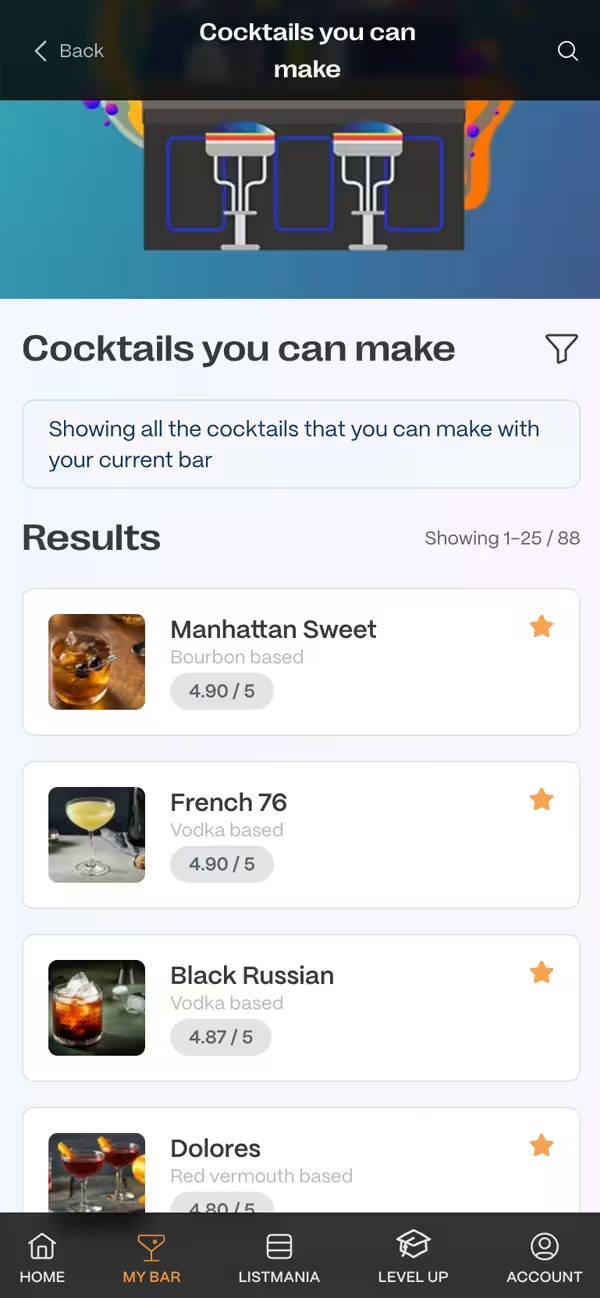Lager
With Lager you can make
A sweet and spicy twist awaits
Oliver Twist
Dry gin, Elderflower Liqueur, Lager, Lemon Juice, Honey (A jar of honey to create chilli infused honey. Only 1 tbsp is needed in the cocktail.), Chilli peppers (Added to the honey to create the chilli infused honey.)
Warmth Beyond the Glass
Pumpkin Bourbon Flip
Rye Whiskey, Amaretto, Lager (Pumpkin spiced ale), Agave syrup, Butter (Pumpkin butter), Egg
Rich and fizzy with a spicy backbone.
Melnyk Flip
Bourbon, Red vermouth, Lager, Angostura Bitters, Honey syrup
Red Eye
Vodka, Lager, Tomato Juice, Egg
Bold and bitey, like a serpent's kiss
Snakebite
Cider, Lager, Blackcurrant Cordial
Mexican Spice, Cooling Refreshment!
Michelada
Lager, Lime juice, Tabasco Sauce, Worcestershire Sauce
Refresh with a citrusy beer twist
Tecate Paloma
Tequila Blanco, Lager, Grapefruit Juice
A Dutch tradition meets sophisticated flair.
Kopstootje Kocktail
Aniseed liqueur, Gin, Lager, Lemon Juice, Sugar / simple Syrup
We've got 8 cocktails that can be made with Lager.
Find out what to make with Lager
Q&A
What is the historical origin of lager and how did it become a popular cocktail ingredient?
Lager traces its origins back to Central Europe in the late Middle Ages, with a significant development occurring in Germany and the Czech Republic. The term 'lager' comes from the German word 'lagern', meaning 'to store', referring to the method of storing the beer at cool temperatures during fermentation. This process, using bottom-fermenting yeast, results in a cleaner, crisper taste compared to ales, which are fermented at warmer temperatures. Lagers became a popular cocktail ingredient due to their versatility and the growing trend of beer cocktails. Their light, refreshing taste and lower alcohol content make them an ideal base or complement in mixed drinks, allowing for the creation of beverages that are not too heavy or overpowering.
How can lager be used in cocktail preparation to enhance flavor?
Lager can be used in cocktail preparation to enhance flavor by capitalizing on its light, crisp characteristics and its carbonation. For instance, using lager as a base in shandys or beer-based cocktails like the Michelada adds a refreshing element that meshes well with a variety of flavors, from citrus to spicy tomato-based mixes. The carbonation of lager also adds texture and effervescence to cocktails, making them more lively and enjoyable. Additionally, experimenting with different styles of lager, such as Pilsners or Dunkels, can introduce subtle maltiness or hoppy bitterness, thereby adding depth and complexity to the cocktail without overwhelming the other ingredients.
What are suitable substitutes for lager in cocktails if it's not available?
If lager is not available, suitable substitutes in cocktails include other light beers such as ales, specifically blonde ales or light pilsners that maintain a similar crispness and lightness. For those looking to mimic the gentle malt flavor of a lager, a mild pale ale could work well. Non-alcoholic options include carbonated beverages like ginger ale, which can replicate lager's effervescence, though the flavor profile will shift towards the sweeter or spicier side depending on the choice. Always consider the overall balance of flavors in the cocktail when selecting a substitute to ensure a harmonious blend.
What are some creative ways to serve cocktails that include lager?
Cocktails that include lager can be served in creative ways to enhance the drinking experience. For instance, serving a Michelada in a chilled, salt-rimmed glass adds a visual and flavorful kick. For shandy variations, consider garnishing with a slice of lemon or lime to accentuate the citrus notes, or add a sprig of fresh herbs like mint or basil for a beautiful and aromatic presentation. Using frosted mugs or glasses not only keeps the drink cold longer but also adds to the visual appeal. Another idea is to layer ingredients carefully for a visually striking effect, playing with the colors and densities of the ingredients to create an Instagram-worthy cocktail.
What role does lager play in the cultural context of cocktails and mixology?
Lager holds a unique place in the cultural context of cocktails and mixology, bridging the traditional beer world with the inventive realm of cocktail creation. Its utilization in cocktails reflects the growing trend towards blending different beverage categories, encouraging experimentation and innovation in the drink industry. Lagers, with their varied styles and origins, bring a sense of global tradition and diversity to cocktail menus, allowing mixologists to draw from a broad palette of flavors and textures. Moreover, the inclusion of lager in cocktails has contributed to the rise of beer cocktails, a genre that appeals to beer aficionados and cocktail enthusiasts alike, fostering a new appreciation for how beer can be enjoyed beyond the pint glass.
Lager Brands
Ingredients like Lager
Other Beers
How it works
Easily create your bar from the ingredients you have at home, and we'll show you what you can make with the ingredients you have to hand.
Once you've added this ingredient head to your My bar page and fill up everything else you have.
We'll also show you cocktails that can make by substituting what you have for one of the ingredients you don't, riffing on the original. Now go forth and create something delicious!






